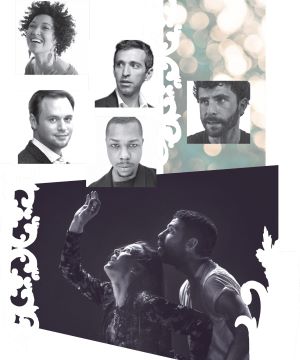Philharmonia Baroque Orchestra and Chorale (PBO) presents the world premiere of The No One’s Rose at Stanford University’s Bing Concert Hall on August 26–29, 2021. (Tickets available HERE.) This production from American Modern Opera Company combines music, dance, poetry, and theater, and features a new score by Matthew Aucoin, set to poetry of Holocaust survivor Paul Celan — alongside music by Bach, Berlioz, Schubert, Sam Cooke, and Paul Simon. The work, which explores deep questions of how to move forward and return to joy after a world-altering catastrophe, assumes even greater significance as the pandemic continues to shift.
Cast & Creative Team
Julia Bullock, soprano
Anthony Roth Costanzo, countertenor
Paul Appleby, tenor
Davóne Tines, bass-baritone
Bobbi Jene Smith, Or Schraiber, and Julia Eichten, dancers
Keir Gogwilt, violin
Coleman Itzkoff, cello
Jonny Allen, percussion
Philharmonia Baroque Orchestra
Zack Winokur, director
Bobbi Jene Smith, choreographer
John Torres, lighting designer
Carlos Soto, costume designer
######
Clockwise from top left: Matthew Aucoin, Zack Winokur, Julia Bullock, Davóne Tines, Anthony Roth Costanzo, Paul Appleby
While the production’s original world premiere was scheduled for October 2020 and was cancelled due to the pandemic, the creators decided that they were still fully committed to this vital project. The production has evolved over the last 18 months as we all face the beginning of the aftermath of the pandemic while acknowledging that the trauma, for many, is ongoing. Aucoin said, “This piece is our way of processing what’s happened to our world over the past year and a half. We’re aiming for a kind of alchemy, to transform the frustrations and sorrows of this moment into catharsis and joy.”
Despite the project’s apparent timeliness, The No One’s Rose has been in the making for six years, and started with a conversation between Aucoin and PBO on Celan and Bach and the possibility of composing for period instruments.
The structure of The No One’s Rose loosely mirrors that of The Canterbury Tales: a series of stories, portraits in time, danced, sung, and played by these remarkable individuals navigating a shared circumstance ’” our actual circumstance ’” of processing the catastrophe of the last year and a half. Beginning in the world of Bach, representing the world as it was, the piece is soon taken over when something enters the air, scattering the company into isolation, and leading them into individual explorations of what is most urgent to them personally. The text of Paul Celan, who himself survived an even more unimaginable tragedy, serves as a spirit guide to forge a path into the future.
Detail from Anselm Keifer's Paul Celan-inspired painting Fadensonnen: es sind noch Lieder zu singen jenseits der Menschen
Anselm Kiefer, prolific German contemporary artist, has graciously provided to Philharmonia the use of an image from one of his paintings: Fadensonnen: es sind noch Lieder zu singen jenseits der Menschen. This work is based on the verse from Paul Celan’s famous poem Thread Suns ’” “There are still songs to sing beyond people.” Much of Kiefer’s work was influenced by Celan.

